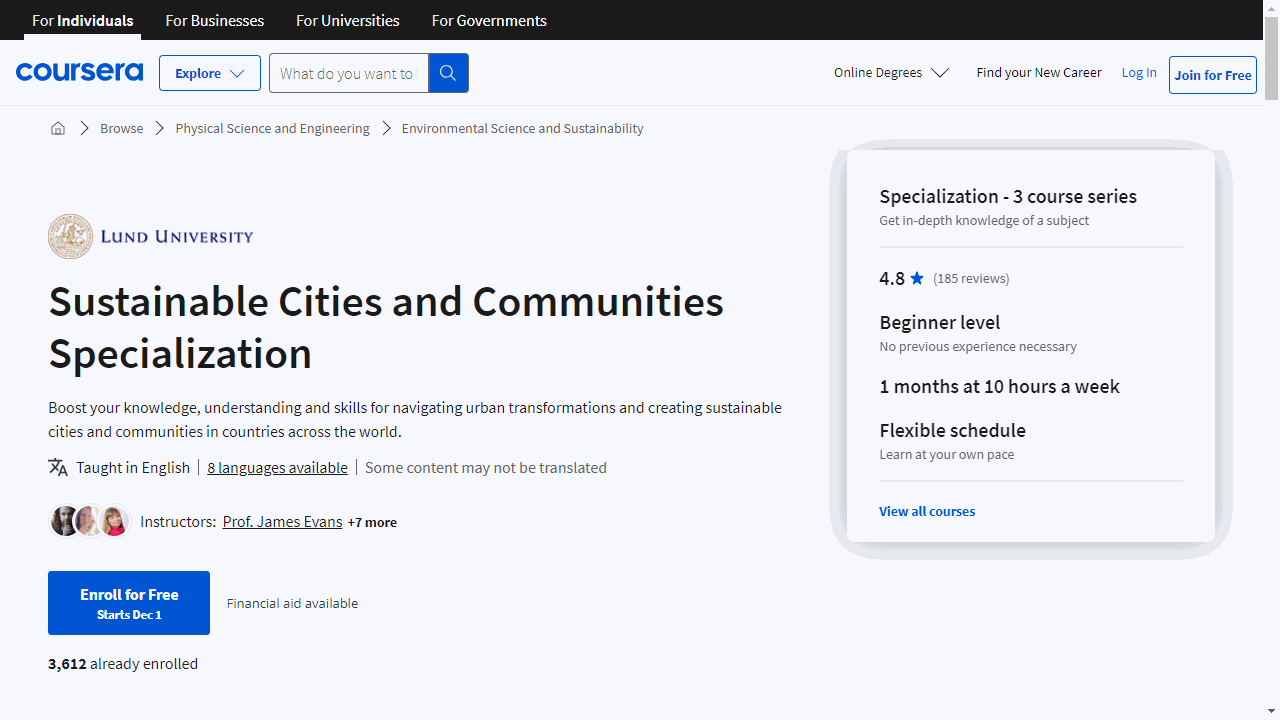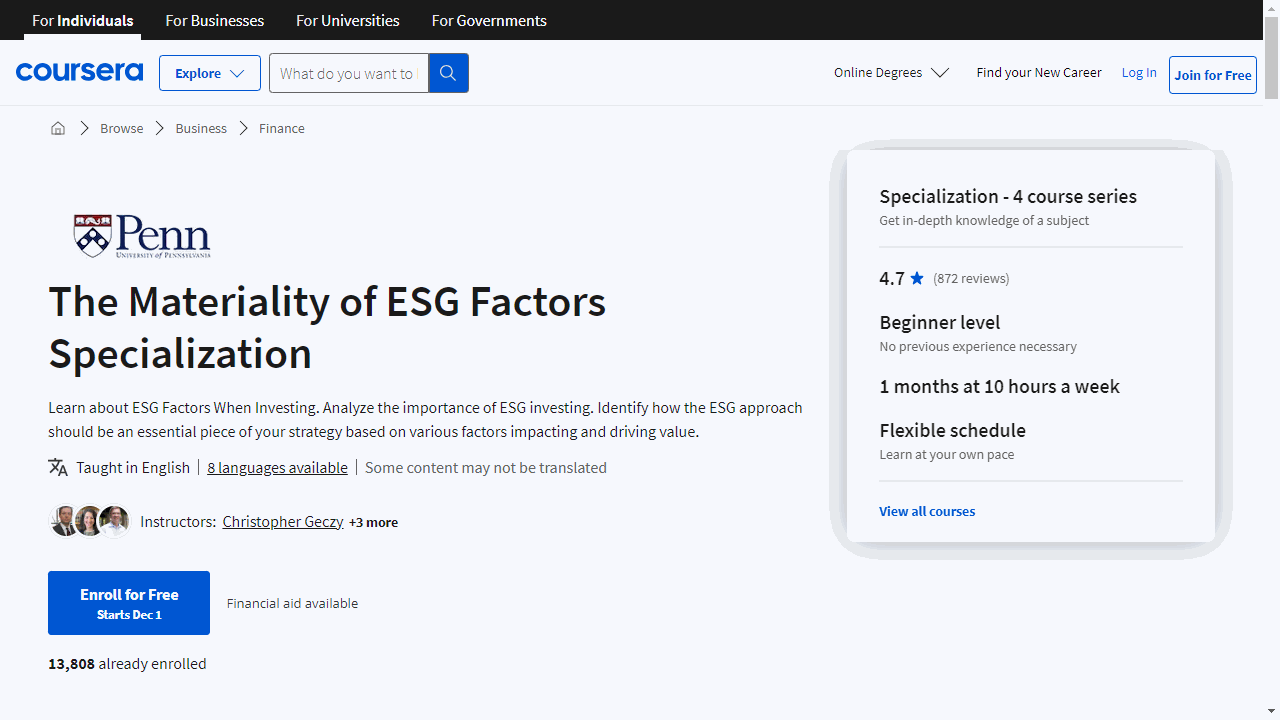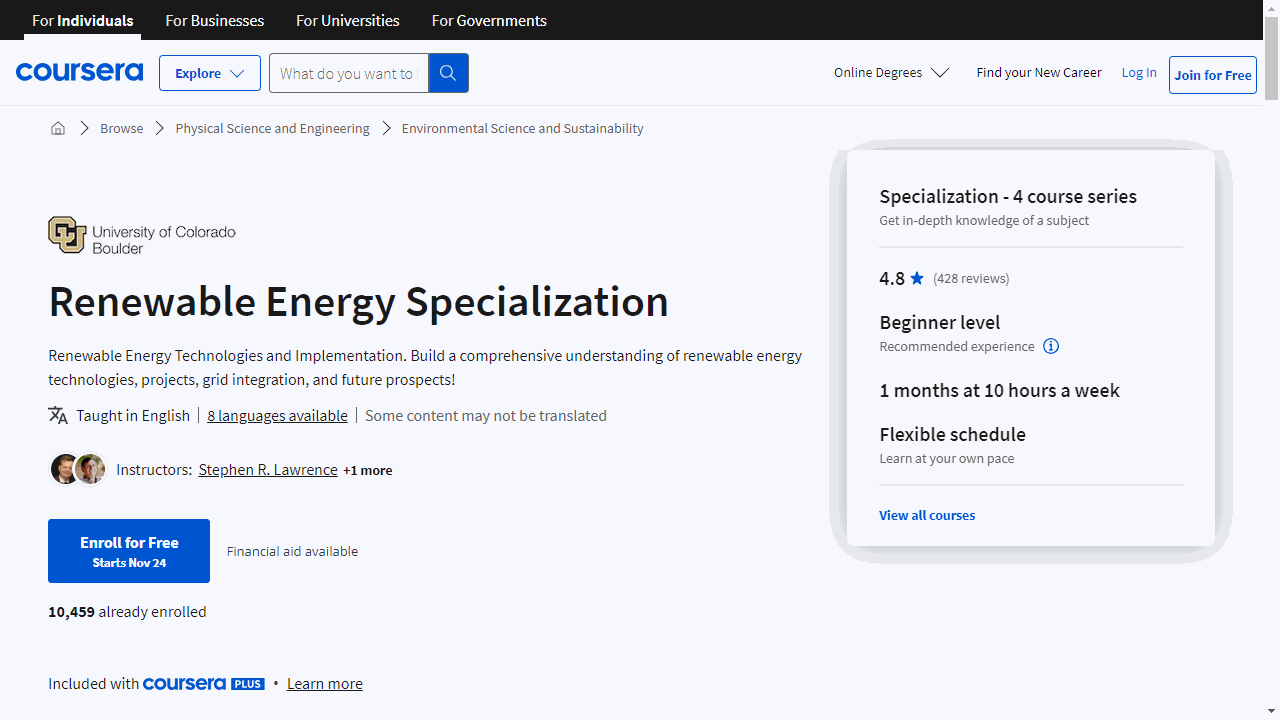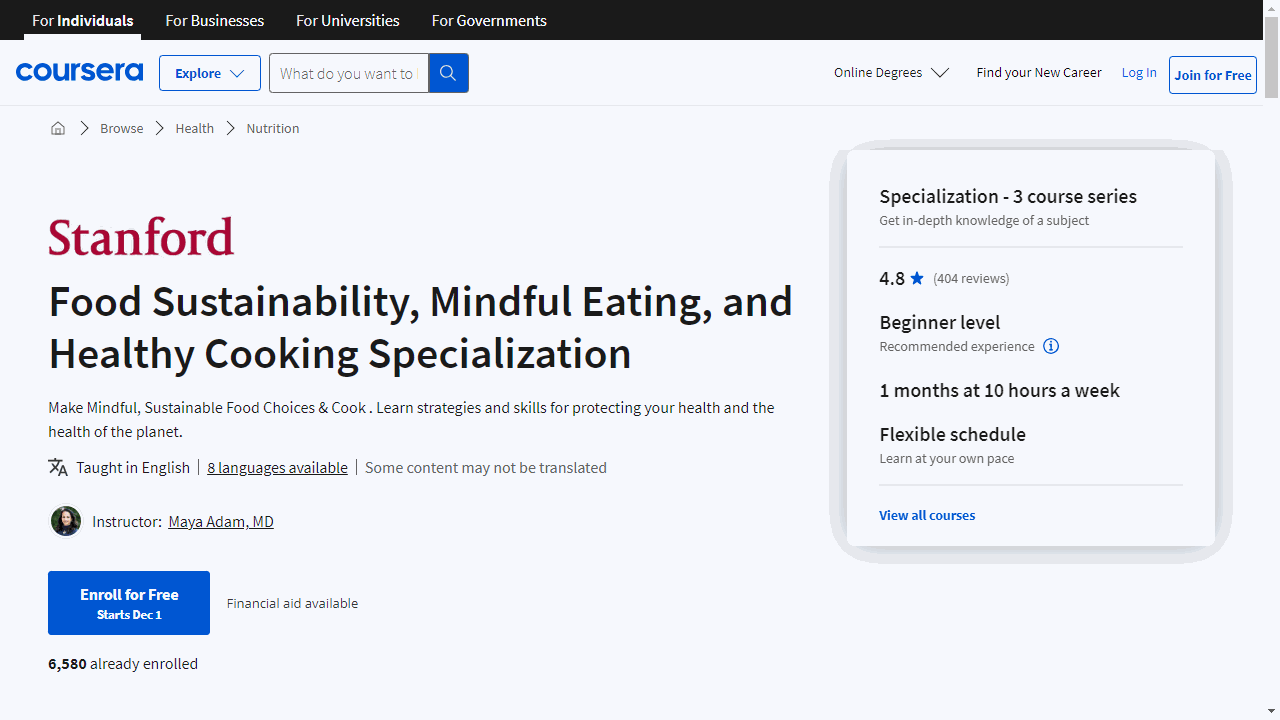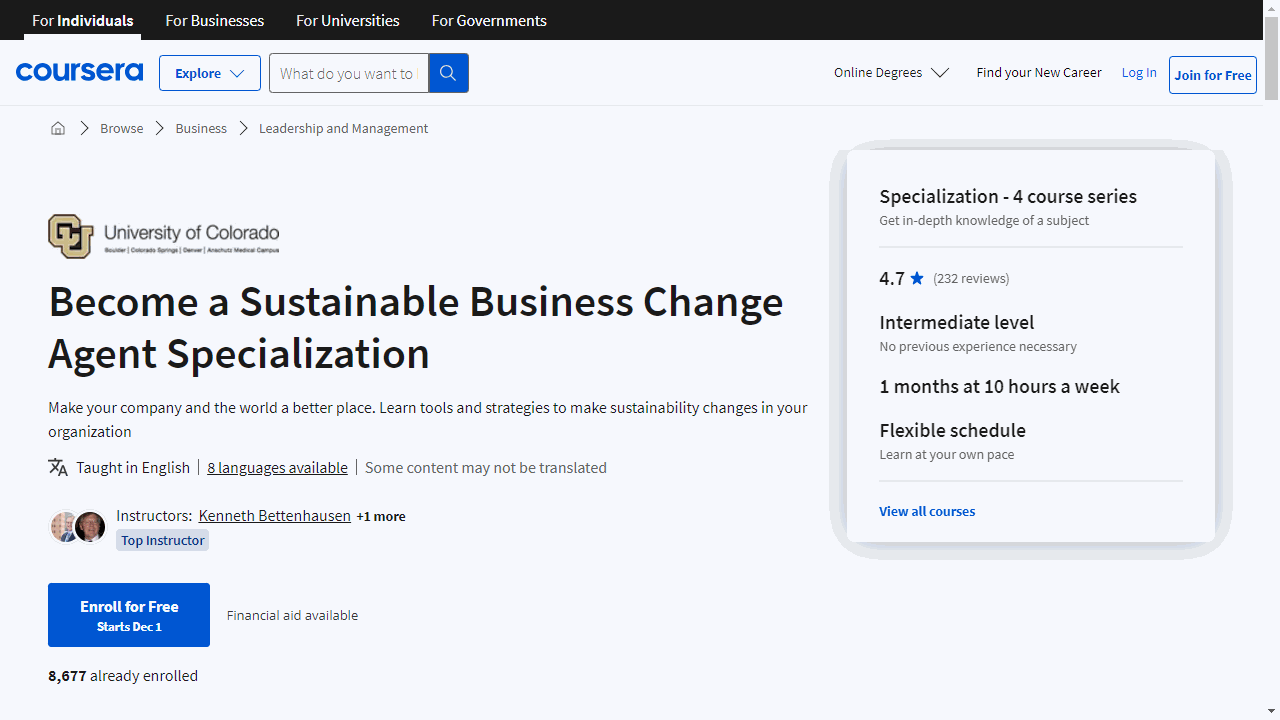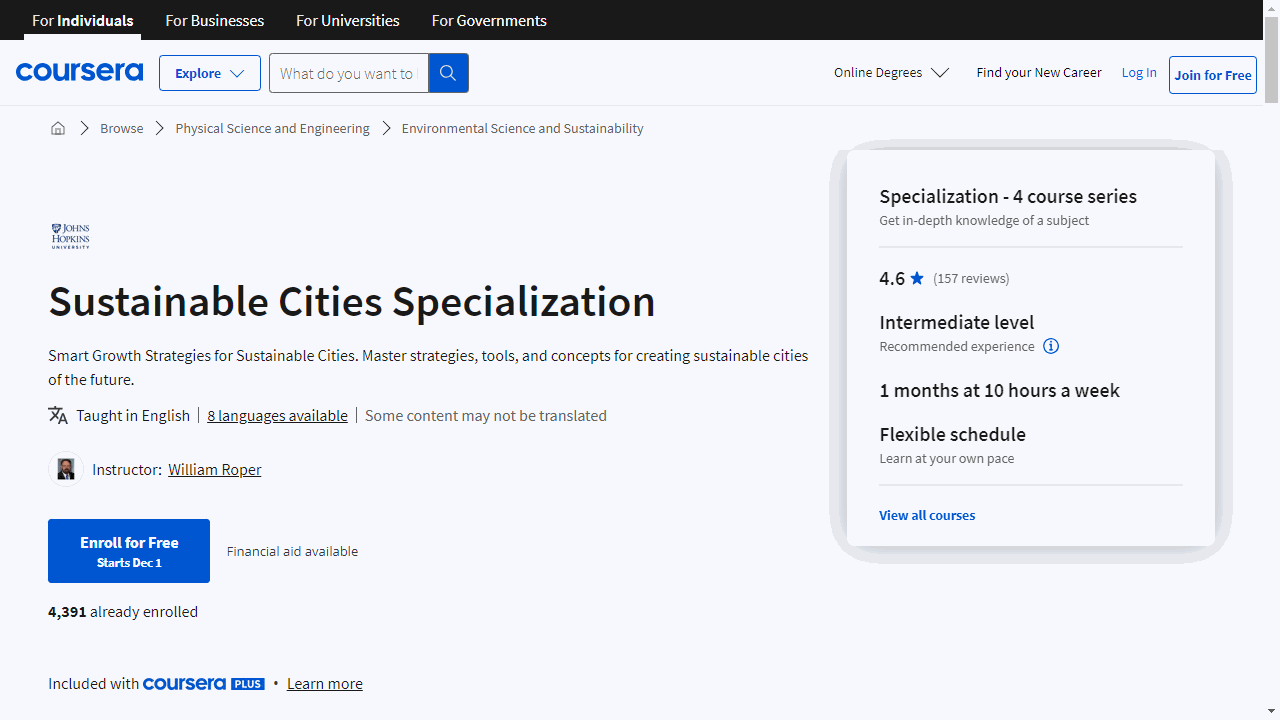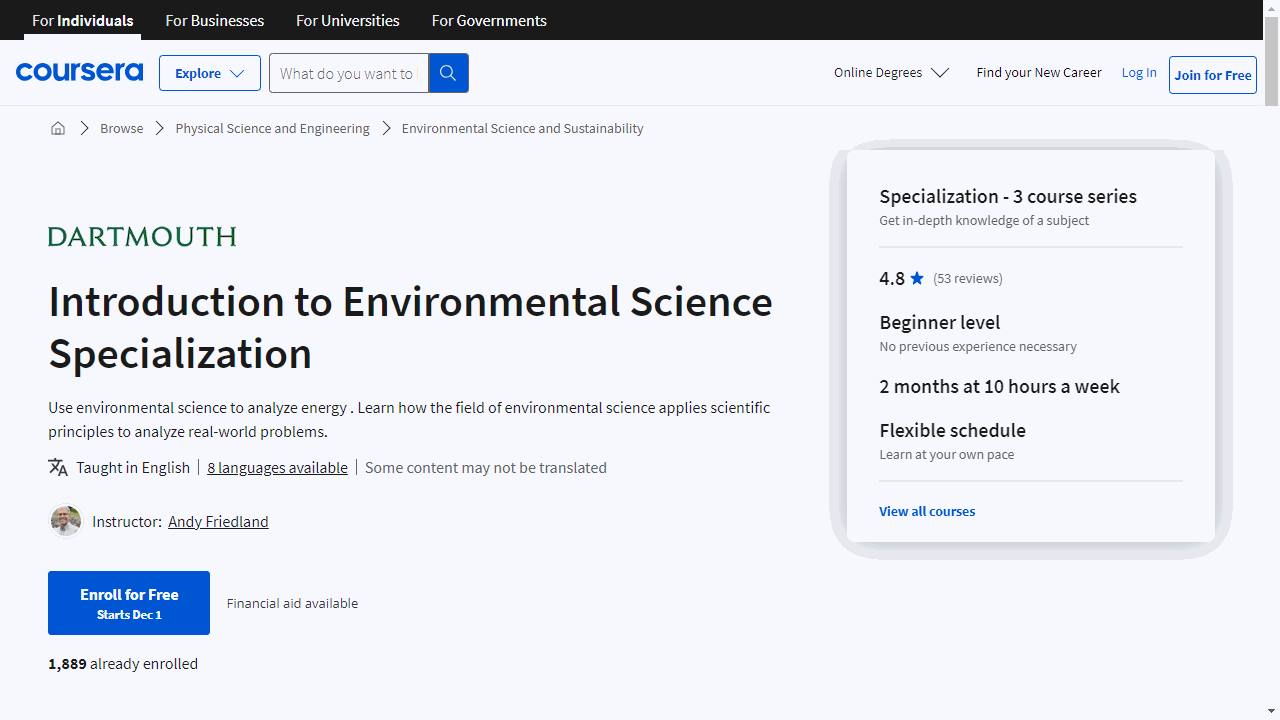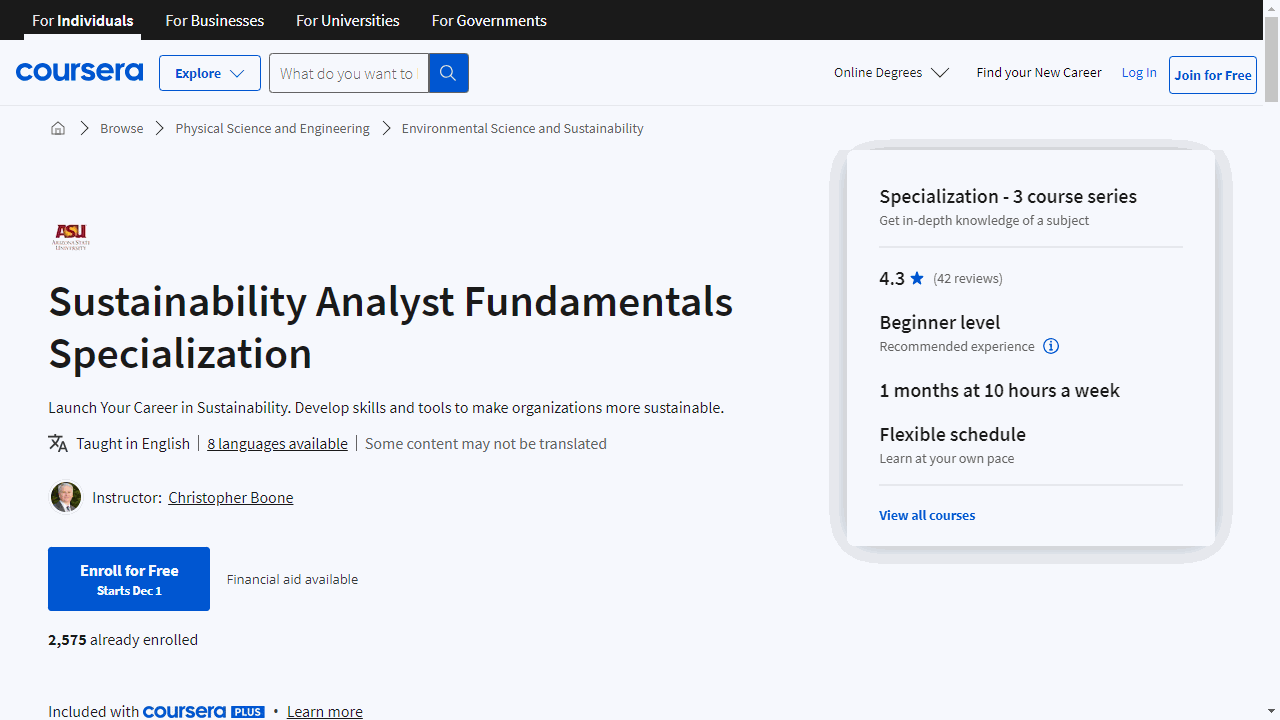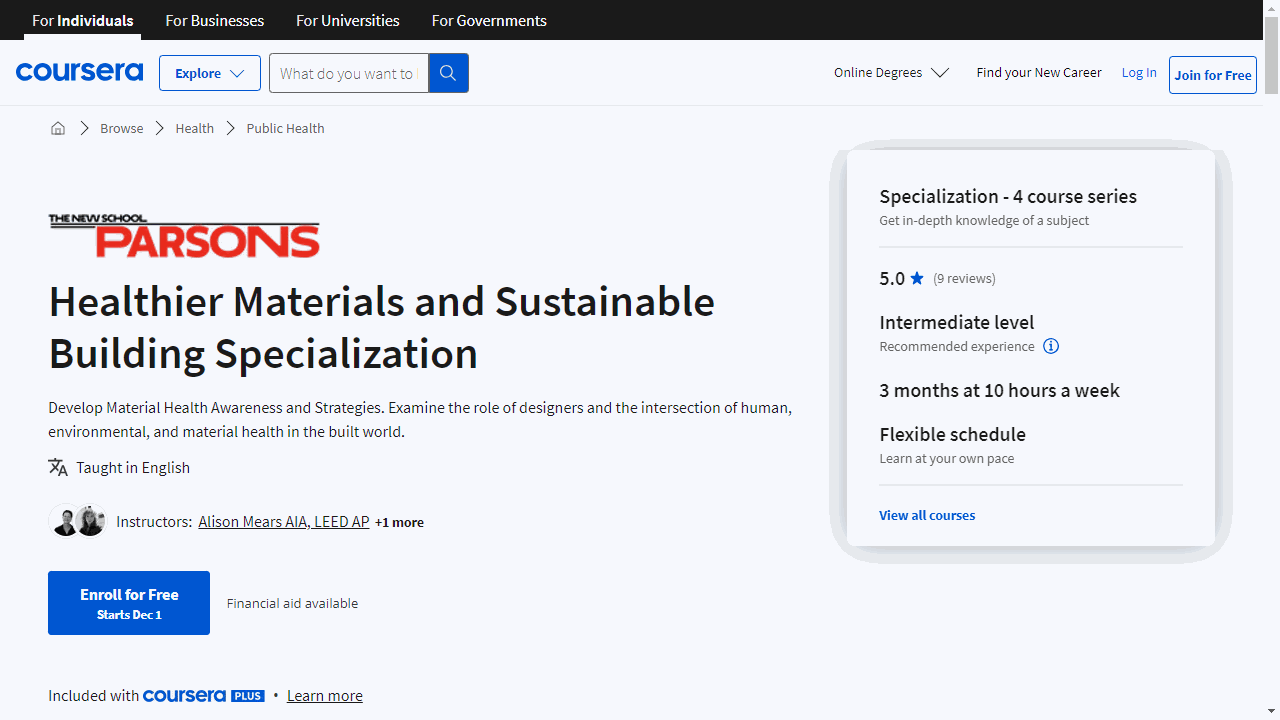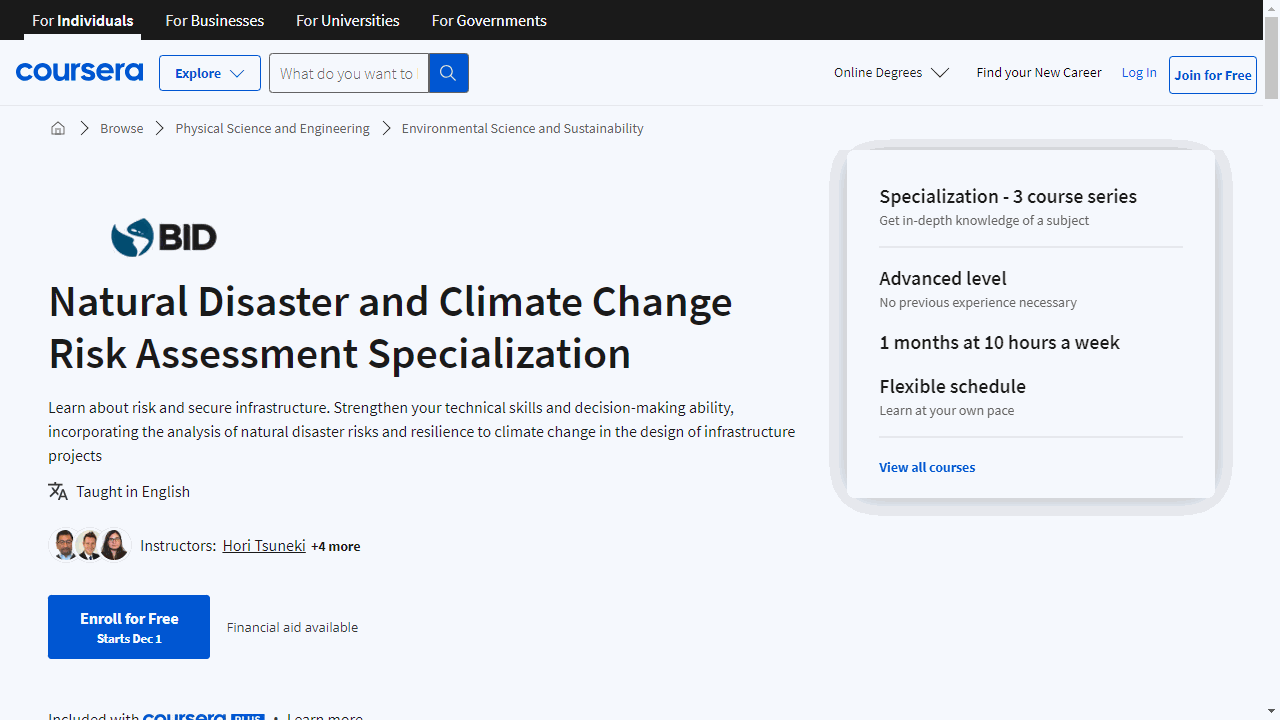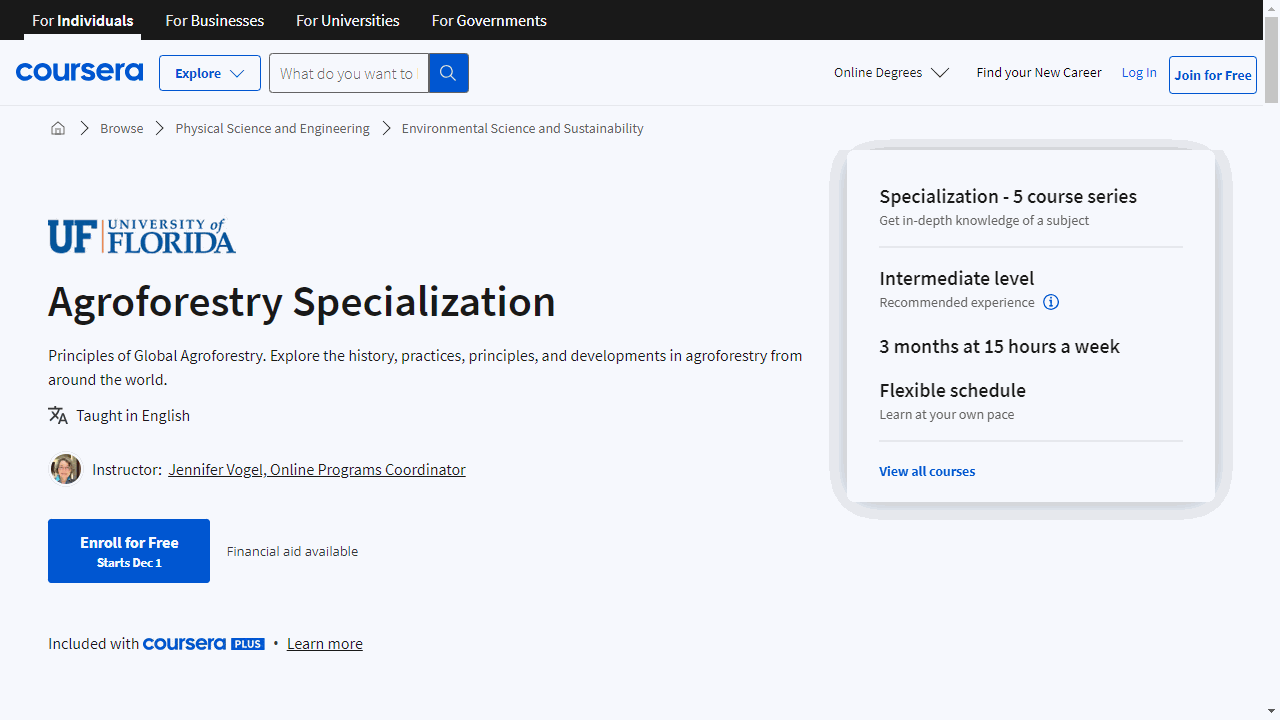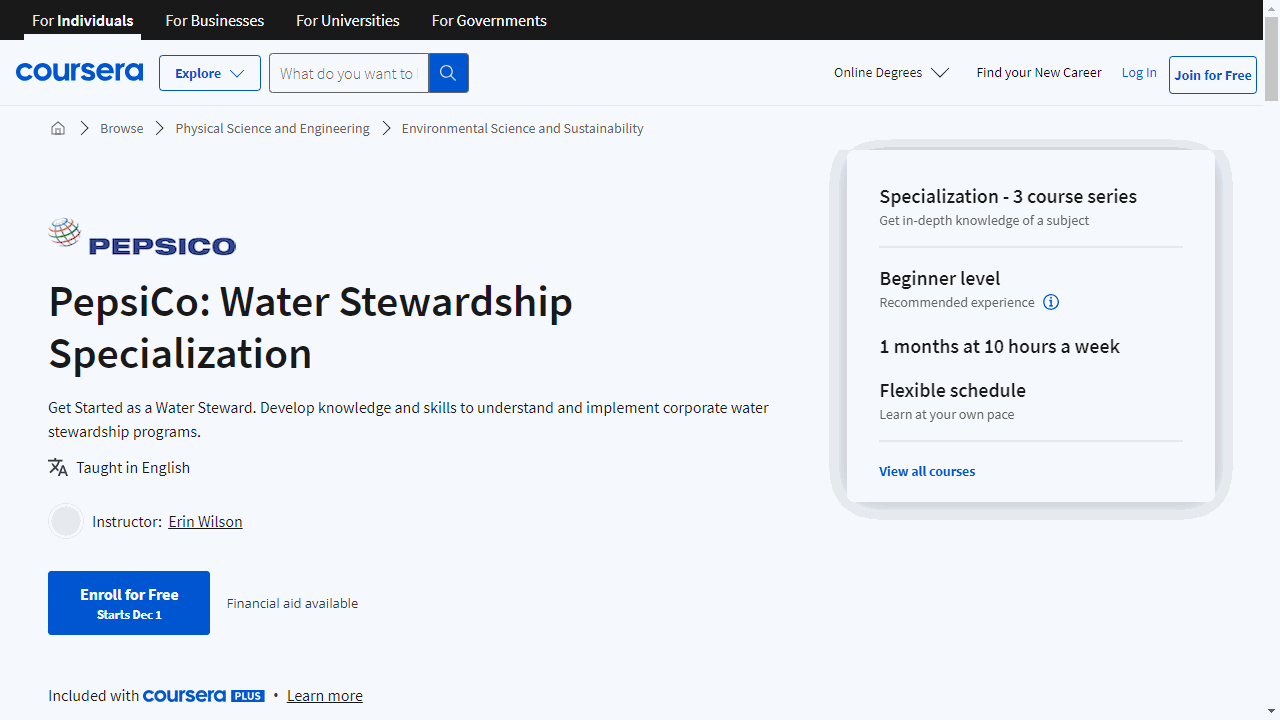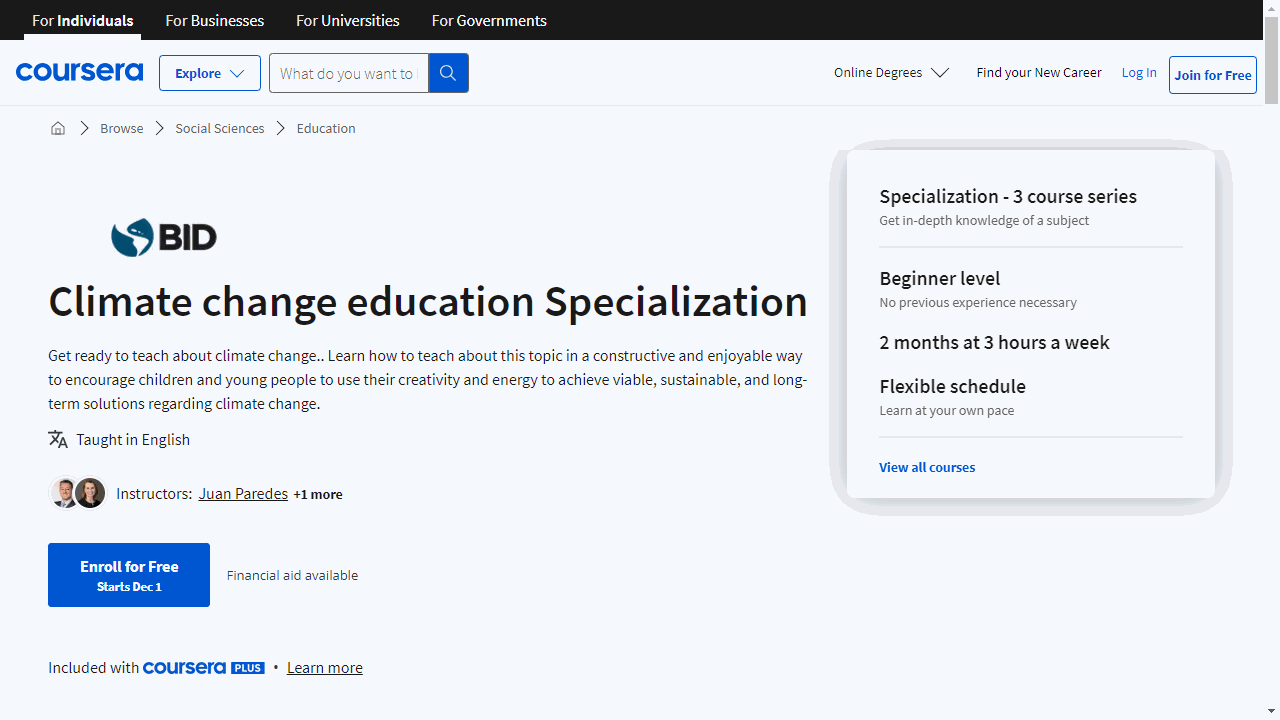Sustainability is a critical issue facing our planet, impacting everything from our environment to our economy and social well-being.
Understanding sustainability principles and practices equips you to make informed decisions, contribute to positive change, and create a more sustainable future for yourself and generations to come.
It’s about creating a balance between meeting the needs of the present without compromising the ability of future generations to meet their own needs.
Learning about sustainability can help you in your personal life, your career, and your community.
Finding the perfect sustainability course on Coursera can be overwhelming, with so many options available.
You’re looking for a program that’s comprehensive, engaging, and taught by experts in the field.
For the best sustainability course overall on Coursera, we recommend the Sustainable Cities and Communities Specialization by Lund University.
This specialization dives into the crucial intersection of urban planning and sustainability, equipping you with the knowledge to create greener, more livable cities.
With modules covering regional sustainability, neighborhood design, sustainable transportation networks, and green construction practices, this program equips you with actionable knowledge to contribute to sustainable urban development.
While this is our top pick, many other exceptional sustainability courses are available on Coursera.
Keep reading to discover recommendations for various learning levels, career paths, and specific areas of interest, from climate change education to agroforestry and more!
Sustainable Cities and Communities Specialization
Starting with “Greening the Economy: Sustainable Cities,” you’ll dissect the intersection of urban development, sustainability, and economic growth.
This course, created by Lund University in collaboration with WWF and ICLEI, equips you with a nuanced understanding of how cities can lead the charge in the green economy.
You’ll emerge with a robust grasp of sustainable urban practices and the systems thinking skills to evaluate them.
“Urban Nature: Connecting Cities, Sustainability and Innovation” offers a deep dive into nature-based solutions for urban design.
It’s a chance to explore how cities can integrate nature to address environmental challenges.
Updated content from 2021, produced with Naturvation partners, ensures you’re getting the latest insights.
You’ll gain a comprehensive view of urban nature’s role in city planning and the innovative strategies at play.
Lastly, “Cities and Consumption: Urban Sustainability and the Sharing Economy” examines the sharing economy’s role in urban life.
This course, refreshed in 2021 and developed with Sharing Cities Sweden, delves into how shared services can promote sustainability in urban settings.
You’ll learn to critically assess the sharing economy’s impact on urban governance and sustainability.
The Materiality of ESG Factors Specialization
With a focus on practical knowledge and real-world application, this program is designed to help you make informed decisions and lead with confidence in the evolving landscape of ESG.
It’s a comprehensive program that equips you with the tools to master ESG investing and strategy.
Dive into “ESG Risks and Opportunities” to understand ESG’s foundations and its impact on the market.
You’ll learn to navigate the complexities of ESG investment, from identifying risks to optimizing portfolios.
This course empowers you to craft robust risk management plans and foster an ESG-aware culture within organizations.
In “ESG Impact: Investor Perspective,” you’ll examine ESG’s role in shaping investment decisions and constructing socially responsible portfolios.
It tackles the intricacies of ESG risks, screening methods, and the relationship between corporate performance and ESG scores.
By the end, you’ll be adept at using ESG ratings to inform your investment choices.
“ESG and Climate Change” focuses on the intersection of business and environmental challenges.
You’ll explore climate disclosures, the role of private governance in climate action, and the concept of greenwashing.
This course provides a clear understanding of how businesses can contribute to a net-zero economy and manage climate-related financial risks.
Lastly, “ESG and Social Activism” explores the influence of social issues on corporate strategy.
You’ll gain insights into the dynamics of corporate boards, the importance of diversity and inclusion, and the impact of social activism on the market.
This course guides you in building governance structures that effectively integrate ESG considerations.
Renewable Energy Specialization
This specialization is a practical, in-depth series that equips you with the knowledge to understand and contribute to the renewable energy sector.
It begins with “Renewable Energy Technology Fundamentals,” where you’ll gain a solid grasp of wind and solar technologies, as well as energy storage systems like batteries and hydrogen.
This foundational course sets the stage for you to engage in discussions and make informed decisions in the renewable energy space.
Moving on to “Renewable Power and Electricity Systems,” you’ll delve into the workings of electricity systems and the integration of renewable sources.
It’s not just about the mechanics; you’ll also explore the market forces driving the shift towards sustainable energy, preparing you to be part of this global transformation.
In “Renewable Energy Projects,” the focus shifts to application.
You’ll learn to navigate the entire lifecycle of renewable energy projects, from feasibility studies to operational management.
This course is crucial for those looking to lead and execute in the field of renewable energy deployment.
Lastly, “Renewable Energy Futures” offers a forward-looking perspective, examining emerging technologies and their interplay with renewables.
You’ll gain insights into the trajectory of renewable energy and its synergies with sectors like electric vehicles and energy storage.
Each course is rich with relevant skills, from project management to understanding the intricacies of energy systems.
Food Sustainability, Mindful Eating, and Healthy Cooking Specialization
This trio of courses is designed to revolutionize your approach to food, from the way you eat to the impact you have on the environment.
Dive into “Rebuilding Our Relationship with Food” to tackle the challenges of sticking to healthy eating habits.
This course equips you with strategies to overcome cravings and establish a positive food relationship through mindful eating and self-compassion.
You’ll learn to identify your eating patterns and create a personalized plan that aligns with your health goals.
In “Introduction to Food and Our Environment,” you’ll gain insights into sustainable eating practices.
This course covers the environmental implications of food production, with a focus on meat and protein consumption.
You’ll learn how to select sustainably sourced meat, understand seafood labels, and reduce food waste.
Whether you’re a beginner or well-versed in sustainability, this course offers actionable tips for making eco-friendly food choices.
“Cooking for Busy Healthy People” is perfect if you’re looking to balance a hectic schedule with the desire to cook nutritious meals.
Learn from both home cooks and professional chefs about principle-based cooking, which frees you from recipe dependency.
This course teaches you to prepare plant-forward meals and stock your kitchen with sustainable ingredients, making healthy cooking a convenient part of your daily routine.
Each course is rich with practical skills that you can immediately apply to your life, enhancing your health and contributing to a greener planet.
Become a Sustainable Business Change Agent Specialization
This specialization is a practical, hands-on series of courses designed to equip you with the tools to advocate for and implement sustainable practices in your workplace.
The journey begins with “First Steps in Making the Business Case for Sustainability,” where you’ll grasp the essentials of being a sustainability advocate.
You’ll learn to identify the environmental and social impacts of business and how to communicate the need for change effectively.
This course empowers you to evaluate sustainability initiatives and craft compelling business cases for them.
Moving on to “More on Change and Sustainability,” you’ll delve deeper into the skills needed to drive change.
Insights from experienced change agents and knowledge in green design and sustainability reporting will prepare you to enhance your company’s products and services or to craft its inaugural sustainability report.
In “Sustainable Business: Big Issues, Big Changes,” you’ll tackle global challenges head-on, from climate change to supply chain management.
The course provides you with tools to help your company navigate these complex issues, including setting science-based carbon reduction targets—a practice adopted by leading global companies.
The capstone project is where theory meets action.
“Capstone: Creating A Sustainability Proposal” challenges you to apply everything you’ve learned by developing a sustainability proposal, either for a hypothetical case or your own company.
This final step is a comprehensive exercise in problem-solving, analysis, and strategic planning.
Throughout the specialization, you’ll stay at the cutting edge of sustainable business practices, contributing to the course’s evolution with your insights.
Sustainable Cities Specialization
This specialization is a practical, in-depth series that equips you with the skills to craft greener, more livable urban spaces.
Dive into “Sustainable Regional Principles, Planning and Transportation” to master the art of regional sustainability.
You’ll learn to create plans that integrate smart growth with community needs, ensuring housing and transportation systems are sustainable and inclusive.
This course is ideal if you’re a government official, architect, or active community member aiming to influence regional development.
In “Sustainable Neighborhoods,” the focus shifts to the building blocks of city life.
Discover how to design complete neighborhoods where schools, parks, and services are just a walk away.
With real-world examples from Texas cities, you’ll grasp the impact of zoning on sustainability.
This course is perfect if you aspire to shape neighborhoods that foster community and environmental well-being.
“Sustainable Transportation Networks and Streetscapes” takes you to the streets, where you’ll explore how to design networks that prioritize safety, connectivity, and aesthetics.
Learn strategies for managing water and creating pedestrian-friendly thoroughfares.
If you’re involved in urban planning or civic design, this course will enhance your ability to create streets that are both functional and inviting.
Finally, “Transportation, Sustainable Buildings, Green Construction” offers a comprehensive look at sustainable urban infrastructure.
From innovative parking solutions to green construction practices, you’ll learn to design buildings that harmonize with the environment.
This course is a must if you’re in the construction industry or passionate about advancing sustainable architecture.
With a focus on real-world application, you’ll finish each course ready to make tangible improvements in urban sustainability.
Introduction to Environmental Science Specialization
This series of courses will equip you with a solid foundation in environmental science and sustainability, tailored to your curiosity and commitment to understanding our planet’s future.
In the “Environmental Science” course, you’ll dissect the nuances between environmental science and related fields, delve into the significance of energy, and unravel the concept of biodiversity.
It’s not just about definitions; you’ll examine how human actions influence global change and what that means for natural ecosystems.
This course is your gateway to grasping the delicate balance between human development and environmental preservation.
Moving on to “Population, Food, and Soil,” you’ll connect the dots between the growing human population and its environmental footprint.
This course tackles the impact of our dietary choices and agricultural practices on the planet.
You’ll gain insights from conversations with professionals in the field, including an environmental scientist and an organic farmer, enriching your understanding of sustainable living.
Lastly, “Energy and Environment” confronts the critical topic of energy.
Here, you’ll compare the environmental footprints of fossil fuels and renewable energy sources, exploring the complexities of our energy choices.
Interactive elements like a virtual tour of a power plant and discussions on alternative energy bring the material to life, making it relevant and engaging.
Sustainability Analyst Fundamentals Specialization
This trio of courses is meticulously designed to equip you with the expertise and practical skills needed for a sustainability analyst role.
Starting with “Careers in Sustainability,” you’ll gain a clear understanding of the sustainability field, with a focus on the analyst’s role.
The course stands out by blending theory with practice, allowing you to apply your learning through interactive exercises.
You’ll craft presentation materials and spreadsheets that you can bring into the workplace, all while honing essential professional skills like effective communication and presentation.
Building on that foundation, “Sustainability Challenges for the Planet and Employers” deepens your knowledge on pressing environmental issues and equips you with tools to address them.
You’ll learn to navigate sustainability indicators and waste management, creating practical resources like checklists and memos.
Peer feedback and expert insights ensure you’re developing robust problem-solving abilities.
The final course, “Foundational Sustainability Skills & Competencies,” transforms your accumulated knowledge into actionable skills.
Here, you’ll focus on goal-setting, reporting, and collaborating for sustainability initiatives.
This course is about application, preparing you to articulate your competencies in interviews and execute your duties effectively once on the job.
Healthier Materials and Sustainable Building Specialization
In “Building Materials and Human Health,” you’ll uncover the hidden impacts of building materials on our well-being.
This course equips you with the skills to assess and mitigate toxic exposure, making you a savvy selector of healthier materials.
It’s ideal if you have a background inpython -m coursera.get_coursera_stuff -i “best astronomy courses” design or architecture, but even without it, you’ll gain valuable insights.
“Material Chemistry and Sustainable Building” takes you deeper into the science of sustainable materials.
You’ll learn to identify and replace harmful chemicals in the built environment.
This knowledge is crucial for anyone looking to lead in the field of green building.
For those with leadership experience in design or architecture, “Sustainable Building: Design and Specification” offers a transformative perspective on material selection.
You’ll learn to prioritize health in your design choices, using cutting-edge tools and resources.
Lastly, “Sustainable Construction in a Circular Economy” broadens your understanding of sustainability in the construction process.
You’ll explore circular design principles and their role in reducing carbon footprints, fostering a regenerative and equitable world.
Each course is rich with practical skills like Green Design and Project Communication, preparing you to make informed decisions that benefit both human health and the environment.
Natural Disaster and Climate Change Risk Assessment Specialization
This specialization equips you with the expertise to tackle the impacts of natural disasters and climate change on infrastructure, a critical skill for sustainable development.
The first course, “Natural Disaster Risk in Infrastructure Projects,” lays the foundation.
You’ll grasp the significance of incorporating disaster risk and climate change into project planning, particularly for regions prone to natural calamities.
By understanding the various risk components, you’ll be better prepared to manage potential setbacks, ensuring project resilience.
Moving on, “Qualitative and Quantitative Analysis of Disaster Risk” deepens your analytical skills.
Here, you’ll learn to apply both qualitative and quantitative methods to assess disaster risks, using specialized software for practical experience.
This course is essential if you aim to excel in risk management or project planning with a focus on climate resilience.
Finally, “Decision Making and Governance of Natural Disaster Risk” hones your strategic decision-making abilities.
You’ll explore how to evaluate project feasibility, prioritize investments with quantitative indicators, and integrate efficiency and equity into risk analysis.
Understanding risk governance and informed public investment is crucial if you’re involved in government, NGOs, or the private sector.
Agroforestry Specialization
This series of courses is a comprehensive journey into agroforestry, a practice that combines agriculture and forestry to create environmentally sustainable land-use systems.
Kick off with “Agroforestry I: Principles and Practices,” where you’ll grasp the essentials of sustainable land use.
This course isn’t just about growing crops; it’s about integrating trees to bolster biodiversity, mitigate climate change, and enhance soil quality.
You’ll be equipped with cutting-edge research and practical know-how.
In “Agroforestry II: Major Systems of the World,” you’ll explore agroforestry practices from diverse regions.
This course offers a rich understanding of how different cultures implement agroforestry, drawing on nearly five decades of expertise.
It’s ideal if you aim to refine your land management skills with a global perspective.
“Agroforestry III: Principles of Plant and Soil Management” delves into the synergy between plants and soil within agroforestry systems.
Here, you’ll learn the critical components for project success, gaining insights into interdisciplinary management techniques.
“Agroforestry IV: Climate, Carbon Storage and Agroforestry” addresses the pressing issue of climate change.
Discover how agroforestry contributes to carbon sequestration and understand its role in the global climate equation.
This course is crucial if you’re passionate about environmental science and practical solutions to climate challenges.
Concluding the specialization, “Agroforestry V: Ecosystem Services, Food and Sustainability” examines how agroforestry practices support ecosystem services, enhance food security, and drive sustainable development.
It’s the culmination of the series, providing a holistic view of agroforestry’s impact on the environment and society.
Each course is rich in practical skills, covering biology, forestry, agronomy, ecology, and horticulture, taught by leading experts.
PepsiCo: Water Stewardship Specialization
This specialization is a deep dive into water sustainability, offering a practical and comprehensive understanding of water management.
The course “The Water Cycle” is your gateway to mastering hydrology and the journey of water.
It’s not just about the natural cycle; you’ll explore the human impact on freshwater ecosystems and the intricacies of water governance, law, and economics.
This course equips you with the knowledge to tackle water-related challenges in urban planning and infrastructure.
Moving on, “Water Security & Stewardship” sharpens your focus on safeguarding our water supply.
It builds on the foundations laid in “The Water Cycle,” emphasizing the strategies for responsible water management.
You’ll delve into the complexities of ensuring water security for future generations, a critical aspect of sustainability.
Lastly, “Water Governance & Economics” merges policy with practicality.
This course offers a deep dive into the policies and economic frameworks that dictate water usage and conservation.
It’s essential for understanding the bigger picture of water management and the financial aspects that drive sustainability efforts.
Climate Change Education Specialization
This is a comprehensive program designed to equip you with a deep understanding of climate change and its impacts.
Dive into “Education on climate change, energy and ecological footprint” to unravel the complexities of climate change.
You’ll learn to identify its causes and effects, and importantly, how to motivate others to take action.
This course empowers you to design strategies for climate change mitigation that are both practical and impactful.
For a closer look at the interplay between the environment and agriculture, “Education on climate change: water and soil” is your go-to.
It sheds light on how climate change affects water resources and soil, directly influencing food security and ecosystems.
Interactive online games within the course make the learning process engaging and memorable.
Lastly, “Climate change education: sustainable environments” tackles the urban angle, examining how cities contribute to climate change and what that means for public health.
You’ll gain insights into creating sustainable environments and learn about the role of human activity in both harming and healing our landscapes.
